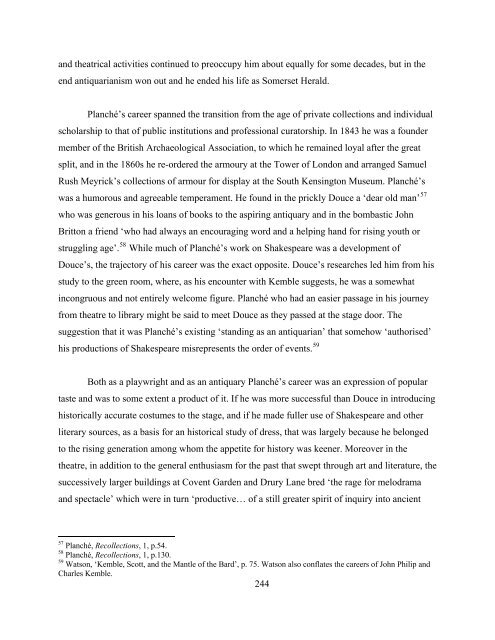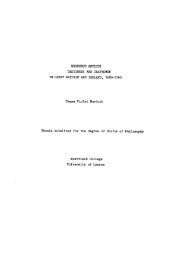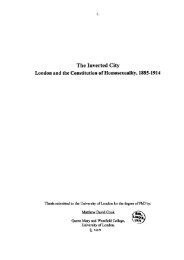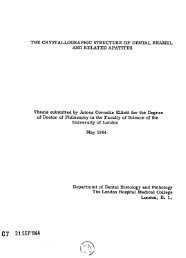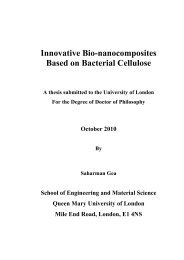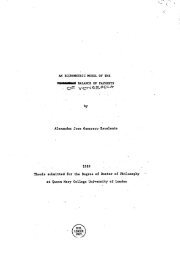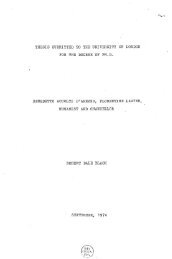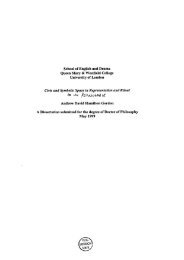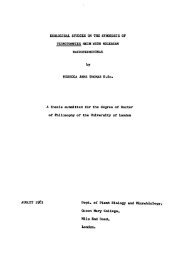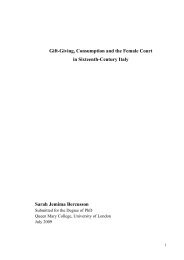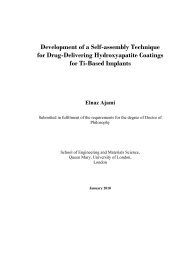Antiquaries in the Age of Romanticism: 1789-1851 - Queen Mary ...
Antiquaries in the Age of Romanticism: 1789-1851 - Queen Mary ...
Antiquaries in the Age of Romanticism: 1789-1851 - Queen Mary ...
Create successful ePaper yourself
Turn your PDF publications into a flip-book with our unique Google optimized e-Paper software.
and <strong>the</strong>atrical activities cont<strong>in</strong>ued to preoccupy him about equally for some decades, but <strong>in</strong> <strong>the</strong><br />
end antiquarianism won out and he ended his life as Somerset Herald.<br />
Planché’s career spanned <strong>the</strong> transition from <strong>the</strong> age <strong>of</strong> private collections and <strong>in</strong>dividual<br />
scholarship to that <strong>of</strong> public <strong>in</strong>stitutions and pr<strong>of</strong>essional curatorship. In 1843 he was a founder<br />
member <strong>of</strong> <strong>the</strong> British Archaeological Association, to which he rema<strong>in</strong>ed loyal after <strong>the</strong> great<br />
split, and <strong>in</strong> <strong>the</strong> 1860s he re-ordered <strong>the</strong> armoury at <strong>the</strong> Tower <strong>of</strong> London and arranged Samuel<br />
Rush Meyrick’s collections <strong>of</strong> armour for display at <strong>the</strong> South Kens<strong>in</strong>gton Museum. Planché’s<br />
was a humorous and agreeable temperament. He found <strong>in</strong> <strong>the</strong> prickly Douce a ‘dear old man’ 57<br />
who was generous <strong>in</strong> his loans <strong>of</strong> books to <strong>the</strong> aspir<strong>in</strong>g antiquary and <strong>in</strong> <strong>the</strong> bombastic John<br />
Britton a friend ‘who had always an encourag<strong>in</strong>g word and a help<strong>in</strong>g hand for ris<strong>in</strong>g youth or<br />
struggl<strong>in</strong>g age’. 58 While much <strong>of</strong> Planché’s work on Shakespeare was a development <strong>of</strong><br />
Douce’s, <strong>the</strong> trajectory <strong>of</strong> his career was <strong>the</strong> exact opposite. Douce’s researches led him from his<br />
study to <strong>the</strong> green room, where, as his encounter with Kemble suggests, he was a somewhat<br />
<strong>in</strong>congruous and not entirely welcome figure. Planché who had an easier passage <strong>in</strong> his journey<br />
from <strong>the</strong>atre to library might be said to meet Douce as <strong>the</strong>y passed at <strong>the</strong> stage door. The<br />
suggestion that it was Planché’s exist<strong>in</strong>g ‘stand<strong>in</strong>g as an antiquarian’ that somehow ‘authorised’<br />
his productions <strong>of</strong> Shakespeare misrepresents <strong>the</strong> order <strong>of</strong> events. 59<br />
Both as a playwright and as an antiquary Planché’s career was an expression <strong>of</strong> popular<br />
taste and was to some extent a product <strong>of</strong> it. If he was more successful than Douce <strong>in</strong> <strong>in</strong>troduc<strong>in</strong>g<br />
historically accurate costumes to <strong>the</strong> stage, and if he made fuller use <strong>of</strong> Shakespeare and o<strong>the</strong>r<br />
literary sources, as a basis for an historical study <strong>of</strong> dress, that was largely because he belonged<br />
to <strong>the</strong> ris<strong>in</strong>g generation among whom <strong>the</strong> appetite for history was keener. Moreover <strong>in</strong> <strong>the</strong><br />
<strong>the</strong>atre, <strong>in</strong> addition to <strong>the</strong> general enthusiasm for <strong>the</strong> past that swept through art and literature, <strong>the</strong><br />
successively larger build<strong>in</strong>gs at Covent Garden and Drury Lane bred ‘<strong>the</strong> rage for melodrama<br />
and spectacle’ which were <strong>in</strong> turn ‘productive… <strong>of</strong> a still greater spirit <strong>of</strong> <strong>in</strong>quiry <strong>in</strong>to ancient<br />
57<br />
Planché, Recollections, 1, p.54.<br />
58<br />
Planché, Recollections, 1, p.130.<br />
59<br />
Watson, ‘Kemble, Scott, and <strong>the</strong> Mantle <strong>of</strong> <strong>the</strong> Bard’, p. 75. Watson also conflates <strong>the</strong> careers <strong>of</strong> John Philip and<br />
Charles Kemble.<br />
244


